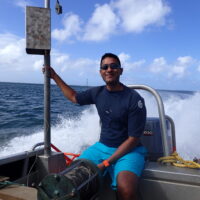Ronal Lal
PhD Candidate
James Cook University

From 2005 to 2022, the main node of the ARC Centre of Excellence for Coral Reef Studies was headquartered at James Cook University in Townsville, Queensland (Australia)








Ronal is born and bred in the beautiful Fiji Islands. He has been actively involved in marine research and teaching at the University of the South Pacific which is located on the main island of Fiji. It was here that he completed his master’s degree and then spent around three years in multiple teaching and research roles working with postgraduate research students. In these roles he particularly enjoyed the logistical and technical aspects of oceanographic monitoring equipment deployment. After relocating to Sydney in 2019, Ronal joined Macquarie University as a research assistant investigating biodiversity on cobblestone, natural beaches and seawalls around Lake Macquarie. Here, he conducted research at the Sydney Institute of Marine Science (SIMS) looking at microbial RNA and DNA. Further to this, he worked as a research assistant at the University of New South Wales investigating the effects of the 2019 Sydney Bushfires which involved extensive laboratory work.
Ever since the completion of his master’s degree Ronal has sought to seek conclusive answers to the resilience and stress response of corals in sub-optimal conditions. It is here at James Cook University that he has found his niche investigating the impact of water quality on the physiological performance of the coral Acropora millepora through strong genomic evaluation, under the supervision of Prof. David Miller, Assoc Prof. Mia Hoogenboom, and Dr. Ira Cooke. Ronal strives to make a formidable contribution to knowledge in this area in order to facilitate coral reef restoration and rehabilitation efforts.
Publications
Lal R, Kininmonth S, N’Yeurt ADR, Riley RH, Rico C. The effects of a stressed inshore urban reef on coral recruitment in Suva Harbour, Fiji. Ecol Evol. 2018; 00:1–15. https://doi.org/10.1002/ece3.4641
McAndrews, R.S., Eich, A., Ford, A.K., Bejarano S., Lal R.R., Ferse S., Coral Reefs. 2019. https://doi.org/10.1007/s00338-019-01780-1
Mangubhai, S., Sykes, H., Lovell, E., Brodie, G., Jupiter, S., Morris, C., Lee, S., Loganimoce, E.M., Rashni, B., Lal, R. and Nand, Y., 2019. Fiji: Coastal and Marine Ecosystems. In World Seas: an Environmental Evaluation (pp. 765-792). Academic Press. https://doi.org/10.1016/B978-0-08-100853-9.00044-0
New DNA techniques are being used to understand how coral reacted to the end of the last ice age in order to better predict how they will cope with current changes to the climate. James Cook Univer
A new study on the effects of climate change in five tropical countries has found fisheries are in more trouble than agriculture, and poor people are in the most danger. Distinguished Profess
James Cook University researchers have found brightly coloured fish are becoming increasingly rare as coral declines, with the phenomenon likely to get worse in the future. Christopher Hemingson, a
Researchers working with stakeholders in the Great Barrier Reef region have come up with ideas on how groups responsible for looking after the reef can operate more effectively when the next bleaching
Abstract: As marine species adapt to climate change, their heat tolerance will likely be under strong selection. Individual variation in heat tolerance and its heritability underpin the potential fo
Abstract: The Reef Ecology Lab in KAUST’s Red Sea Research Center explores many aspects of movement ecology of marine organisms, ranging from adult migrations to intergenerational larval dispersal
Abstract: Macroalgal meadows are a prominent, yet often maligned component of the tropical seascape. Our work at Ningaloo reef in WA demonstrate that canopy forming macroalgae provide habitat for ad
Abstract: Sharks are generally perceived as strong and fearsome animals. With fossils dating back at least 420 million years, sharks are not only majestic top predators but they also outlived dinosa
Abstract: Connectivity plays a vital role in many ecosystems through its effects on fundamental ecological and evolutionary processes. Its consequences for populations and metapopulations have been
Abstract: Evolution of many eukaryotic organisms is affected by interactions with microbes. Microbial symbioses can ultimately reflect host’s diet, habitat range, and even body shape. However, how
Abstract: The past few years have seen unprecedented coral bleaching and mortality on the Great Barrier Reef (GBR) but the consequences of this on biodiversity are not yet known. This talk will expl